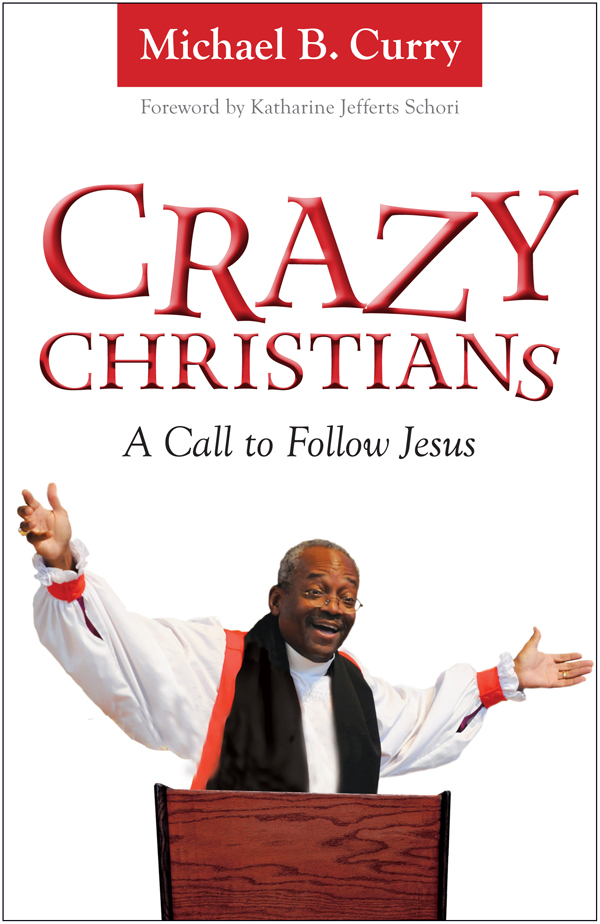This Tuesday we are wrapping up our reading of Bishop Curry’s book Crazy Christians: A Call to Follow Jesus. We will be discussing chapters 11, 12, and 13. Please have your bibles with you as you read through these final chapters.
In Chapter 11 “E. Pluribus Unum”, Curry speaks about how the church bringing unity in Christ out of a diversity of backgrounds, and that this call is greatest challenge of the Church today. Curry grounds our unity not in anything we do but in the very reality of the Incarnation. For in the Incarnation, the unqualified fullness of God, put on flesh and walked among us. Col. 1:19, John 1:14. When we are “baptized into Christ (and into the reality of the Trinity and the Incarnation) we put on Christ [where] there is neither Jew nor Greek, slave nor free, male nor female.” Gal. 3:27. For when we have been joined with Jesus in our baptism then the Church takes on the unity and reality of the Incarnation. In achieving the Incarnation, Christ emptied himself of his glory and his desires and died so that we could bear much fruit. Phil 2:7, John 12:24. Therefore, think about what selfish interests we each have that must die so that the reality of a unity in diversity may occur.
In Chapter 12 “ The Gospel Witness of Welcome”, Curry takes us through the birth of the Church as the great welcoming bride of Christ beginning with the call to a tax collector (Roman collaborator) and a Zealot (Jewish rebel) as disciples and continuing through the book of Acts where heretical Samaritan, eunuch Ethiopian, persecuting Pharisees, and unclean Roman soldiers are all welcomed by God. Curry points out that being truly welcoming is never benign. Whenever the church welcomes someone different, it necessarily changes. We see this in the call of Cornelius the Centurion in Acts 11:1-18. When the Holy Spirit welcomed a Roman into a Jewish Church, that which the law called unclean was now made clean, and a Jewish church had to change to accommodate this Roman. As in the last chapter, the Church can make these accommodations and change when it remains rooted in the reality of our shared baptism. Curry has a good discussion on how the church has both changed as society changes, but also how it remains steadfast in the the reality of our baptism. Think through how the church does change, as it did in the time of Peter, but how its core values of following Jesus are timeless.
Bishop Curry ends his book with the first apostolic commission – given to Mary Magdalene to go and to tell the others to meet him in Galilee. As we looked at two weeks ago, Biblical mountain tops aren’t geographic but spiritual for wherever God surprises and meets us is our mountaintop. In the same way, Galilee isn’t merely an area in the Levant, rather it is the world – the messy jumbled place where the children of God live and dwell. John begins by telling us that the Word put on flesh and walked among us, and Mark begins by telling us that the Word went into Galilee. This is the same statement but different imagery. Just as the Word came down from heaven to earth, so too we must leave the mountain of God and go into the Galilean world. Curry has a wonderful (and very short) statement on what it means to go into Galilee is HERE. The address upon which chapter 13 is based is HERE. Myrtle Beach is a great example of living in Galilee. Think about how we are being led to take the Gospel from off the mountaintop and from behind the chancel and the walls of the church into Galilee and the streets of our town.
Dinner is at 6. The menu is Southern pot pie (ham, greens, and black-eyed peas). Discussion about 6:45. Please remember in two weeks (February 16) we are beginning our Lenten study of Henri Nouwen’s book The Return of the Prodigal Son: A Story of Homecoming. We’ll have books available on Tuesday. Cost is $10. Hope to see you here.
Therefore remember that at one time you Gentiles in the flesh, called the uncircumcision by what is called the circumcision, which is made in the flesh by hands— remember that you were at that time separated from Christ, alienated from the commonwealth of Israel, and strangers to the covenants of promise, having no hope and without God in the world. But now in Christ Jesus you who once were far off have been brought near in the blood of Christ. For he is our peace, who has made us both one, and has broken down the dividing wall of hostility, by abolishing in his flesh the law of commandments and ordinances, that he might create in himself one new man in place of the two, so making peace, and might reconcile us both to God in one body through the cross, thereby bringing the hostility to an end.
Ephesians 2:11-15

